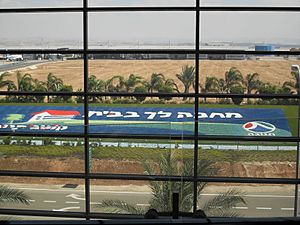Cottage cheese boycott facts for kids
The cottage cheese boycott was a big protest in Israel that started in June 2011. People used Facebook to organize it. The protest was against the rising cost of food in Israel. Organizers asked everyone to stop buying cottage cheese. This food is seen as a basic item in Israel. Soon, 100,000 people joined the Facebook protest page. The boycott quickly grew and made people talk about the high cost of living in Israel.
Even with special sales, supermarkets sold much less cottage cheese from Israel's top dairies. Because of the boycott, the price of cottage cheese in the country went down.
Contents
Why Prices Rose
Cottage cheese is very popular in Israel. Many Israelis see it as a basic food. The company Tnuva sells over 70% of all dairy products. Strauss and Tara sell the rest. Before the boycott, very few dairy products were brought into Israel from other countries. This was because of very high taxes, sometimes over 100%.
Because Tnuva sells so much dairy, the Israel Antitrust Authority sees it as a legal monopoly. This means the government can control Tnuva's prices to stop them from charging too much. In August 2008, Israel's Finance Minister said the government would stop controlling the price of cottage cheese. A 250 ml (9-ounce) tub cost about 4.82 NIS then. The idea was to create more competition. But this did not happen. In three years, the price of cottage cheese went up by about 45%. It reached about 8 NIS.
How a Company Caused Price Hikes
According to the Israeli newspaper Globes, a British company called Apax Partners caused the price increase. Apax Partners bought a large part of Tnuva. They told Tnuva's leaders to raise the company's value. This plan was called "Quick Wins." Apax wanted to buy companies, make them more valuable, and then sell them within six years.
Apax then hired McKinsey & Company, an American consulting firm. They looked at how much Tnuva could charge. McKinsey and Tnuva's main economist, Dr. Shula Pesach, studied this. They found that Tnuva could raise prices by at least 15%. They thought this would not hurt how many people bought their products. But Dr. Pesach warned that the price hike could "blow up in the company's face." Some people at Tnuva told Globes that they knew prices would keep going up. This was true even before the cost of raw milk went up.
The Protest Begins
Ilanit Chaim wrote many articles in Globes. These articles talked about the rising food prices in Israel. In June 2011, Itzik Alrov from Bnei Brak started a protest group on Facebook. He asked Israelis to stop buying cottage cheese first.
The boycott was planned for July 1, 2011. But it got a lot of attention in the news. Tens of thousands of Facebook users joined the group. Soon, over 100,000 people had joined. So, the boycott started earlier, in mid-June 2011. People were told to buy cottage cheese only if it cost less than 5 NIS. They were also asked to boycott other dairy products.
Legal Action and More Boycotts
In September 2011, a big class action lawsuit was filed against Tnuva. The lawsuit claimed Tnuva used its power to raise cottage cheese prices. They said prices went up by over 40% between 2006 and 2011. The Israel Antitrust Authority also started looking into Tnuva. They wanted to see if Tnuva had used its monopoly power unfairly.
The CEO of Apax Partners in Israel said they would not lower the price of cottage cheese. After this, other Facebook groups started. They called for people to boycott all of Tnuva's products.
Impact of the Boycott
Experts studied the cottage cheese boycott. They found that people bought 30% less cottage cheese because of the protest. Also, people became less loyal to certain brands. They cared more about the price and were willing to buy different brands. This change was stronger in areas where more people used social media. This shows that social media helped people organize the protest. After the boycott, prices were much lower than what companies could have charged to make the most profit. This suggests that companies kept prices lower. They likely worried the boycott would spread to other products. They also worried about the government getting involved because of high prices.
See also
 In Spanish: Boicot al Cottage para niños
In Spanish: Boicot al Cottage para niños


